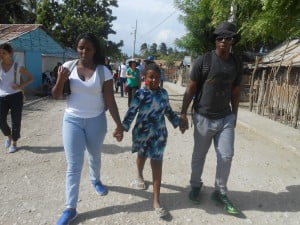
Kaya and Malcolm made a friend in the batey
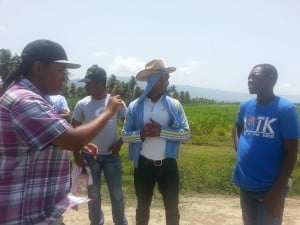
Sadiya using sign language to learn about a deaf community member.
“This is the moment to when we must build on the wealth that open markets have created, and share it benefits more equability. Trade has been a cornerstone of our growth and global development. But we will not be able to sustain growth if it favors the few and not the many.” – Barack Obama
Today we live in the world of open market. We trade globally all over the world, which benefits growth and development. However this wealth realistically will not be sustainable or achievable for a long period, when only a few feel the benefits, leaving out the majority. Individuals in this era still worry about themselves and not the wealthy. Still to this day, people don’t understand what needs to happen in order to stop the poverty and death that comes from lack of food and water. The United States should help in a way that will help jobs increase in countries that need it the most.

Looking at sugar cane from Barbados
Today was the day that made everyone’s minds think differently about life, and how we could help individuals make a living out of the small things they have. Visiting the sugar cane fields of DR made me think of what it would be like growing crops to help the community. Seeing first hand how sugar cane crops are cut, cleaned, processed and cooked to be created into the sugar we know today, and knowing that this is a 24 hour long process all to create this small grain we take for granted really opened my eyes. Behind each grain of sugar there is a worker who works up to 16 hours a day in conditions that are either terrible or supposedly privileged, depending on your position.
Visiting the housing complex and being given a tour of the facility made the job at the sugar cane worker seem wonderful. To have the privilege of earning up to 17,000 pesos or over $400 US dollars every 15 days without having to pay taxes or insurance if you injured on the job, seemed unrealistically glorious. The tour guide who was in charge of the housing complex shared the wonderful treatment of the workers. He explained that the Haitain sugar cane cutters live in the housing complex now because if they mixed with the local batey community, they would fight; so the sugar cane company must protect them from harm. He said that in the three years since the enclosed housing complex was built, they never had a problem of injury, disobedience, or unsatisfied employees.
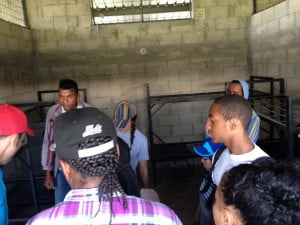
A room for 10 sugar cane cutters at the new housing complex
Later in the day we visited a place called the Bateyes, which were communities of people who used to work the sugar cane back when it was government owned. These communities are deep in poverty, most are illiterate, and unemployed. They are stuck in the cycle. They can’t get a job because they’re illiterate and they can’t get a good education because they don’t have a job. The history of the sugar business in the Dominican Republic was shocking. That two American brothers from Texas, came to the DR with the idea of sugar cane fields. Originally black Americans were brought over to work the fields, but they rebelled and claimed the work was too hard. So an agreement was made with the brothers and the World Trade Center (in America) to bring in Haitians to cut the sugar cane. When the sugar cane industry became privatized, the bateyes or the communities were abandoned. The brothers came over 100 years ago and their impact is obvious today. As an American I am ashamed of what part my country has done to cause the bateyes.
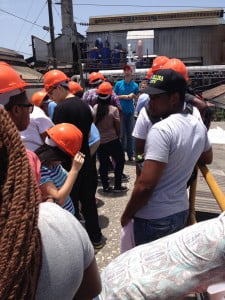
At the sugar mill- the last stop before the sugar is put into boats and shipped for export
Seeing the bateyes for the first time today made me feel a certain way because the government plays an important role. Money is the main issue throughout the difficulties in many countries, but the Dominican Republic is one of the poorest and needs medical attention and more money to prevent the deaths caused by no food and water. Walking around and seeing the broken down houses made me feel grateful of the things I have and the food I eat every day. Families in the bateyes don’t have enough food and have to eat small portions that really don’t fill them up. I just want to say that, being an American is very hard and we should realize that there are people who need our help and are begging for attention. What I saw today was devastating, to see actual living people in these conditions. And we all have failed to help them. Seeing how bad their situations have made me even more grateful for all the things I have and opportunities I have. One thing that will forever stick with me is that these people have no options. Most of them are stuck in the problem, they can’t or don’t even know how to get out of.
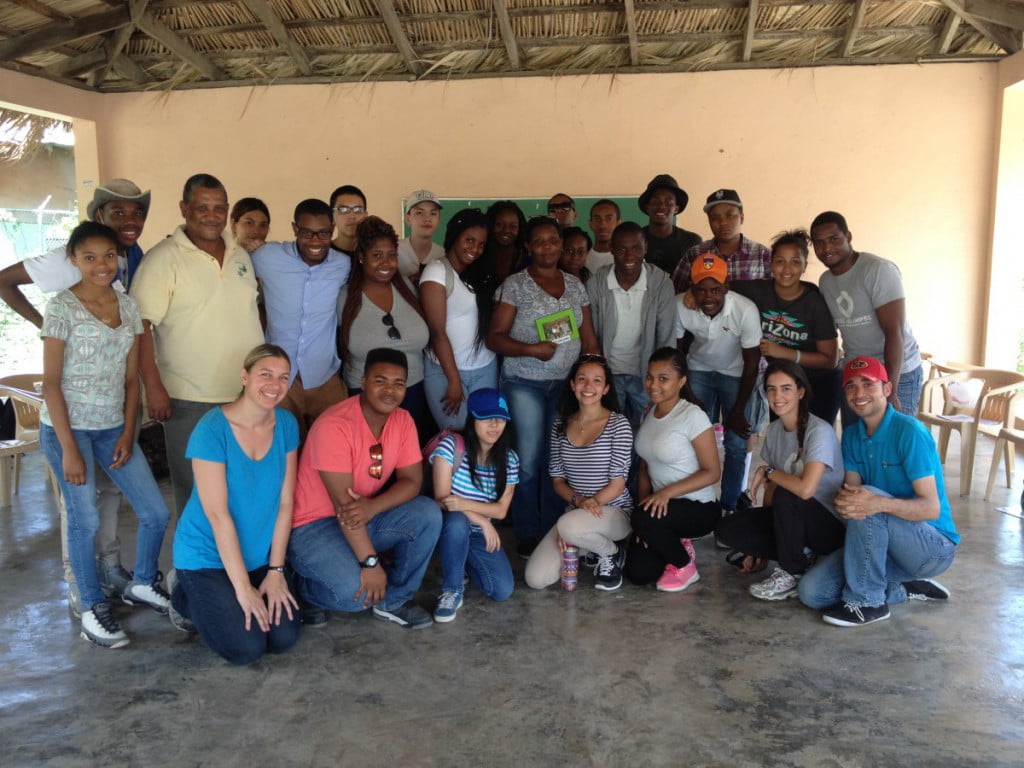
With our partners in the batey, Plataforma Vida
To have also learned about perspective, the problem between Haiti and DR are a lot more complex than just immigration. Many Dominicans feel that Haiti and DR are brothers but separate countries. That to be in the country you need documentation papers and without it you will be deported. But Dominicans also believe that many Dominicans who are born in DR and are of Haitian decent are not legal citizens. And those who are in this situation are claimed by neither county, so they become stuck. They can never receive a job or education so they mainly live in the Bateyes. I feel I cannot really form the slightest idea of the intertwined problems of Haiti without talking to all parties involved. We mostly spoke with Dominicans so I know their perspective, but I want to keep hearing from Haitians. I heard a wise young German girl who was interning at the sugar foundation say that many countries like America are making decisions and to solve a DR and Haitian problem without knowing both sides of the situations and their needs.

Ivie and Malcom,
You both did a fantastic job on your blog. It was informative and thought provoking.
This experience is educational and powerful on many levels. There is so much work that needs to done, lessons to be learned and a lot to reflect on. You all were taken out of your comfortable lifestyles and comfort zones and came face to face with the harsh realities that occur in the world. You all are handling it like true champions and leaders. I miss you Kaya!!!
Ivie and Malcolm! I”m so impressed with your critical thinking about the issues you experienced on this day. You took the time to think beneath the surface. It sounds like a fire has been sparked in you. I look forward to watching how you continue to grow from this experience and what passion and knowledge you bring back to New York. Keep up the great work!
What great deeper thinking about the complexities of life. Having this experience will change the way you see everything. This wisdom is invaluable. I can’t wait to hear all about your new insight when you get home. Continue to make Crew 506 proud! ~Beth
Ivie and Malcolm, I’m so glad you two were leaders together for such an eye-opening experience. Exposure to these realities is what will help you be the change you want to see in the world. I miss you all, see you soon!
Wow, great blog Ivie and Malcolm! What an eye opening and unforgettable experience. It really shapes how you might see yourself and your responsibilities as a global citizen. What impact will each of you make on our world?!
Ivie Malcom….I am proud of you guys, a real nice blog. You have seen Polical, economic, social and cultrail dynamics of one country DR. The building of a global market to service 7 billion people will be the challenge of your generation.
Great read! Good job sis and Malcolm. Very well rounded. There ARE 2 sides to every story and that fact is often neglected. Massive intervention is needed on a macrosocial scale.
Hi Ivie & Malcolm
Your blog is wonderful! Good to hear this is a true learning experience.
Great job Malcom and Ivie. Love you Malcom. We miss you.